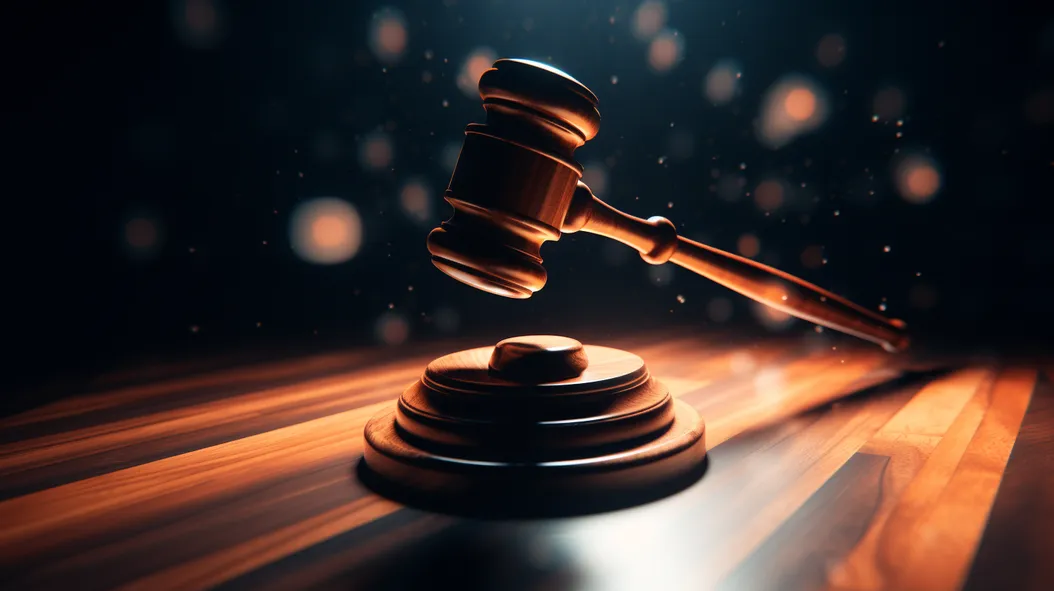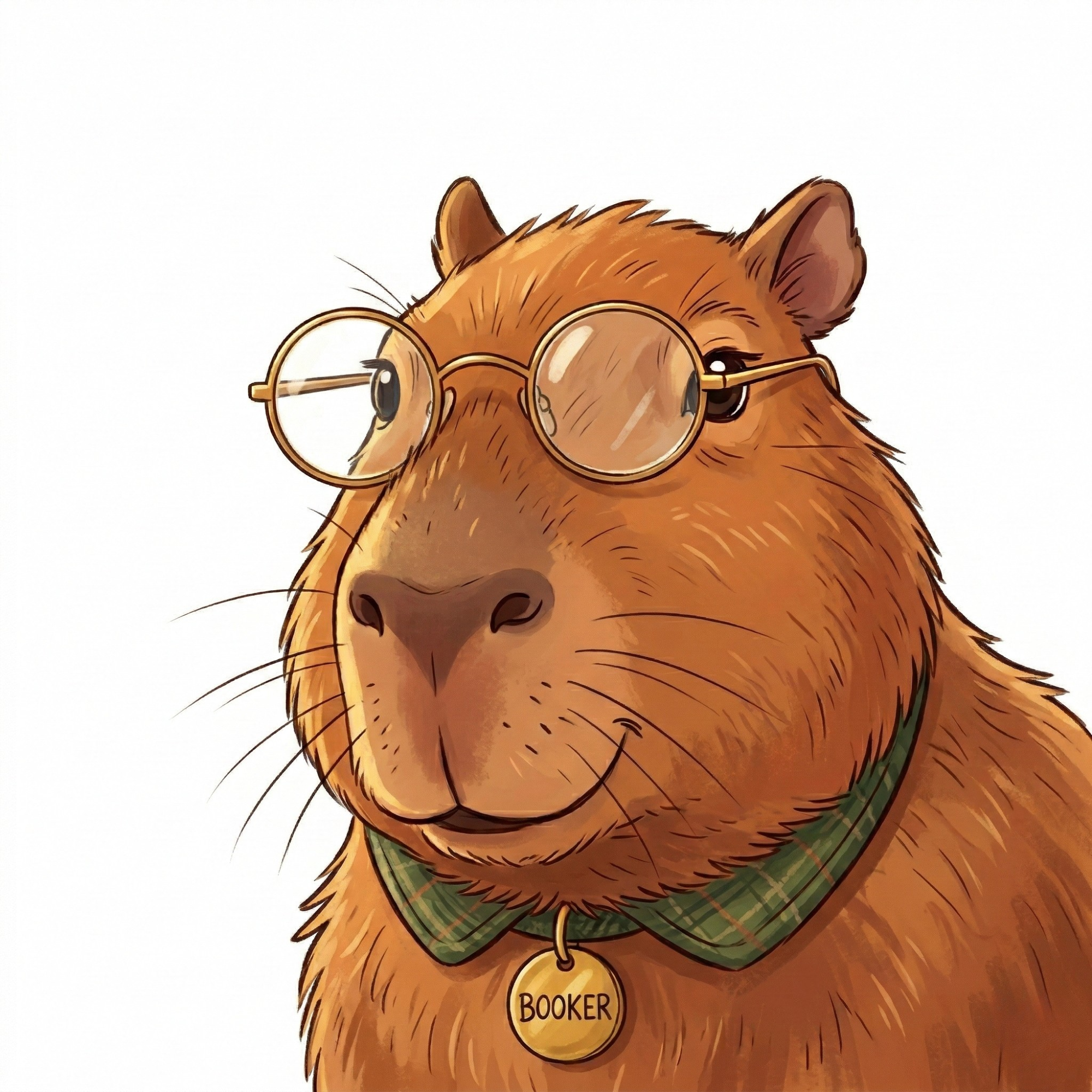ここに日本語でお読みください
Keith "Off-the-Cuff" Hayden.
The day a Senior Master Sergeant called me that was the moment I knew I had a problem.
It wasn't meant to be a dig. It was a compliment, from an experienced Airman who I deeply respected, said in a half-joking manner.
These kinds of comments said in jest are typical when you're a Second Lieutenant in the US military.
Everybody wants to take a crack at the new "butter bar" to see if you'll melt under pressure or shine like gold.
What troubled me was how the name stuck with me. Others didn’t use it, but it wormed its way to my psyche and stayed for a long time.
If I had known it would take me the better part of a decade to let it go, and transform into a truly confident communicator, I would have been even more bothered by it.
Pyramid of Ideas is a reader-supported publication. To receive new posts and support my work, consider becoming a free or paid subscriber.
They say many adults fear public speaking more than death. At least that's what they used to say (I have no idea what 'they' say about it now.)
But what I know for sure is that:
Lack of effective public speaking skills causes professionals to miss out on valuable opportunities every day.
You know what I'm talking about, right?
Heart thudding, arms tense, you remain silent during a meeting when you could have spoken up.
Face tight, eyes hard, you're swept away by emotion in a contentious one-on-one conversation, unable to get your point across.
Awash in relief, yet regretful, you think of that great zinger of a comment shortly after the moment has expired.
These are just a few of the scenarios I've found myself in many times throughout my professional life.
But it doesn't have to be this way.
You CAN improve. You can learn to express yourself clearly, with the right dose of competence and passion.
In this ultimate guide of The Creative Futurist, I'll show ways you can do it, by walking you through the evolution of my personal public speaking journey.
It begins on the bleachers standing among my entire 7th grade class.
Quiet Country Kid Finds His Angle
"He's quiet."
This is how my Mom would describe me to others when I was young.
Suffering from the dreaded "middle-child" syndrome (as she would often call it) I felt like a sleepy suburb between the attention-grabbing lights of my brothers. Both were magnets for my parents’ attention for various reasons.
Me, on the other hand, outside of our house, I often felt invisible. Left to wander the worlds of books, maps, and video games I often explored with my brothers and friends.
All that changed in 7th grade.
One day toward the end of the school year, they lined our class up in orderly rows to take an annual class photo.
Of course, I had taken many school pictures before that point, but this one was different. When the print arrived at school weeks later, it came in a white cardboard tube. I took it home, popped off the lid and unrolled it.
My eyes rapidly scanned the rows looking for where I was standing. I found my best friend Ryan first, his amicable boy-smile looked like it always had.
Standing next to him was me. But I looked different.
Maybe it was the way the light caught that day. Or the slight angle that my head was tilted at, I don't know. But I looked at the picture several times and asked myself:
"Am I...posing?"
I was! In the center of the sea of students, my face was an offer. It was an invitation for friendship, opportunity, and eh..hem other adult things I would come to know later on.
Looking back it was the birth of my ego. A great and terrible thing. It would play a large role in my development (or lack thereof) as a public speaker for the majority of my life.
Natural Talent
For the rest of my school days, I let my natural talent carry me to strange and wonderful places.
I was on my school's first news broadcast the next year in 8th grade (I did the weather segment.)
In high school I joined the school newspaper, which had me talking to adults selling ads in our area.
I was very active in my high school, Junior Reserve Officer Training Corps (JROTC). A military-lite program that allowed me to lead younger students in basic military standards and procedures.
My senior year, I joined the drama club, winning an award for "Best Male Actor" in my role as Oliver in Shakespeare's As You Like It.
Then came college.
My time as school mascot, allowed me to express myself more openly (since I was always wearing a mask). It was quite a memorable experience.
It was also during this time, that I began to learn about how to give real presentations.
One of the early lessons I still call upon to this day when giving any kind of presentation is to:
Always have at least three points to say about a topic.
The list could be likes and dislikes, or if I’m really at a loss asking myself 3 questions about the subject, then answering them in the presentation.
That always gets me coming up with great ideas.
At my school (the United States Air Force Academy), every class provided a training opportunity (at least that's what they told us.)
During my sophomore year, was when things began to change.
Before mock briefs, I was sweating through my uniform.
I found my heart pounding uncontrollably moments before my time to speak. I felt the eyes of my classmates and instructors piercing through me, as if they could see I was ready to wither and run behind my facade of youthful vigor.
That's the trouble with being a "natural" at something.
It makes it harder to see when you need help.
It damn sure makes it harder to get the help.
It's an advantage that becomes an anchor of weakness.
I’m not sure what brought it on.
Maybe it was general anxiety about leaving college and becoming a true adult.
Maybe it was that I had started drinking coffee in college, causing me to become increasingly jittery in general. (Now, I drink much less than I used. I have none at all on days I have important presentations or meetings.)
Whatever was happening to me, by surprise, was a signal I had reached the limit of how far natural talent could take me.
"Off-the-cuff"
Despite growing awareness of my discomfort with public speaking, I powered through, just as I was trained to do.
Secretly, I was hoping that earning the rank and title of Second Lieutenant upon graduation would somehow provide me with the ability to tap into the well of confidence that I knew was there somewhere inside me.
But it didn't.
Upon arriving at my first duty station at Nellis Air Force Base in Las Vegas, I was still the secretly sweaty LT. Only now, I had a new nickname: Keith "Off-the-cuff" Hayden.
What's so bad about that name?
It was how I got it that bothered me most.
Y'see in order to mask my nervousness, I became known for saying half witty comments with little foresight during meetings and other gatherings.
I was never rude, disruptive, or disrespectful. But that was my schtick.
I think my co-workers found it somewhat endearing. (After all, I was an LT and wasn't expected to know a damn thing.)
But I knew one thing they didn't: I was compensating hard to mask my discomfort.
I was the woman criticizing others because she's secretly insecure.
I was the man reacting with violence toward any perceived threat because he's secretly terrified.
It wasn't who I wanted to be.
It was around that time that I decided to take the first steps to actively improving my speaking skills.
The Panic
I had my first ever panic attack during an interrogation, but I wasn't being questioned.
I was a Special Agent with the Air Force Office of Special Investigations. Highly trained. Elite. Deadly. A gold badge on my left hip, a Sig Sauer P226 on my right - I was the epitome of strength and style to onlookers.
But in the interview room that day, I felt small.
It was his interrogation, not mine, yet I was falling apart much more than he was.
I could hear it in my voice.
The shaking, sweating, and staring; the world collapsed in on me. I didn't think I would make it through the routine rights advisement.
It was a relief when he lawyered up.
Even though we had expected him to, I knew part of it was because of my lackluster performance.
My agent training had fallen away, and all I knew was primal fear for some imagined danger.
Lost in his own dire situation, the kid (one being interrogated) didn't notice. I don't think my co-workers (who were watching via the double glass window) noticed either.
But the memory clung to me like a stench. I was ashamed.
I never forgot that day.
It reminded me that status can't protect you from your weaknesses.
Eventually you have to stop lying to yourself and face them head on.
It would take me another few years to put action behind this thought and stop running.
A Public Speaker In-training
Surfing, swimming, and sun-bathing are all ideal activities on Hawaii's world-famous beaches.
Attending a public speaking class? Probably isn't on that list. Not even close.
Yet there I was. Blocks from the stunningly beautiful Waikiki Beach on a weekday evening, planning out another practice speech.
The class was run by a woman named Pamela (I think). I don't remember a lot about her except for her full head of snow-white hair and her voice.
THAT voice.
Her voice was sharp. Not loud, but it was a multi-purpose tool. She could dial it up or down with nuanced ease. It was an example I would come to emulate as I retrained myself to be a better communicator.
This brings me to another nugget of actionable advice you can take to improve your verbal communication skills:
Take a public speaking class.
I’ll bet $100 you won't be alone if you do. I wasn't.
There were a dozen other students sitting right beside me. And it wasn't just younger people like me (I was 29 at the time). The spread of the age range was fairly wide.
There were middle-aged corporate workers, older students, and fresh college grads looking to break out of their shells for the first time.
I was quite surprised by the make-up of the course participants.
But we were all there for the same purpose: to improve our ability to communicate in public.
And I was improving.
With each exercise and every mock speech, I began to feel more comfortable standing alone in front of a crowd and delivering a message.
I was even starting to enjoy myself again. Throwing in some of my characteristic witty humor from my boyhood days.
But just as I was really finding my stride, the class ended.
More challenging still, Pamela wasn't planning on having another class for a while (and I would have to pay again).
I wasn't ready to lose my momentum and progress, I had to find a way to continue.
So I asked her about a way that I could keep practicing in a similar environment.
That's how I discovered Toastmasters.
Master of Toasts?
Toastmasters is a funny name for a public speaking club.
"Are they masters of making toasts at parties?"
or
"Are they really good at making breakfast toast?"
Turns out it’s neither. Toastmasters is a near century old group that began as a way for a guy who worked at a YMCA in California to help young men improve their communication skills.
It has since evolved into an international organization with over a quarter million members.
I didn't know all this back then. All I knew was it was a way to keep improving my speaking skills. So I went to a meeting.
There happened to be a club that met on the base I was assigned to in Hawaii.
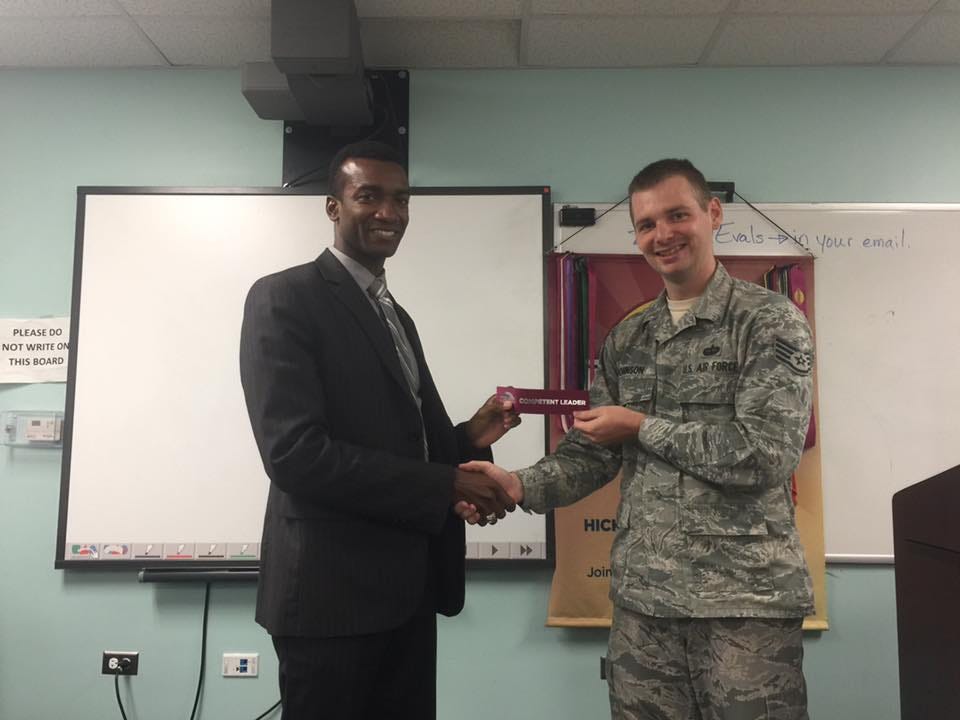
Hickam Toastmasters was my first club. Truthfully, I don't recall much about my first visit. I must have been too swept up in the energy of the meeting.
People jumped up and gave speeches. Some were serious, others were silly. There was an electricity in the air despite the relatively orderly sequence of events.
Here’s my very first ice breaker speech.
https://www.facebook.com/watch/?v=639145276121945
Then it was time for Table Topics.
If you're unfamiliar, the Table Topics session is the impromptu speaking portion of a Toastmasters meeting. It allows members to practice speaking on the spot about random topics with little time for preparation.
When I learned about Table Topics, I was immediately thrilled. This was the perfect place for Keith "Off-the-cuff" Hayden, a former award-winning impromptu speaker in his elementary school days, to shine. And he did.
During that very first meeting, I gave Table Topics a try. I won "Best Table Topics Speaker" that day.
If your public speaking skills need work, I highly suggest you consider joining a Toastmasters club in your area.
I've visited clubs around the world, and most have a friendly atmosphere that allows for experimentation, cushioned failure, and growth.
Every role is an opportunity to improve. Feedback —difficult to come by in the professional world (unless it's negative)—is given freely and openly. This allows you to pinpoint areas of weakness to begin shoring them up.
Do you have a favorite crutch word? (Mine's "so")
Do you do weird things with your hands (like moving too much or not at all (dead hands)) when you speak?
Do you suddenly talk too fast (motormouth) or too slow (slowspeak) due to nerves in front of a crowd?
A Toastmasters club will help you identify and -in time- correct these barriers to strong communication.
First of His Name in Leadership
Strong communication skills are vital when it comes to being an impactful leader.
Whether you're leading a large organization or a solo business, your ability to express yourself with clarity will directly affect your relationships, mission effectiveness, and your bottom-line (more money).
Leadership opportunities are another reason I enjoy Toastmasters.
I eventually served as the Vice President of Education (VPE) for the Hickam Toastmasters. I was even featured in a 2016 issue of Toastmasters Magazine.
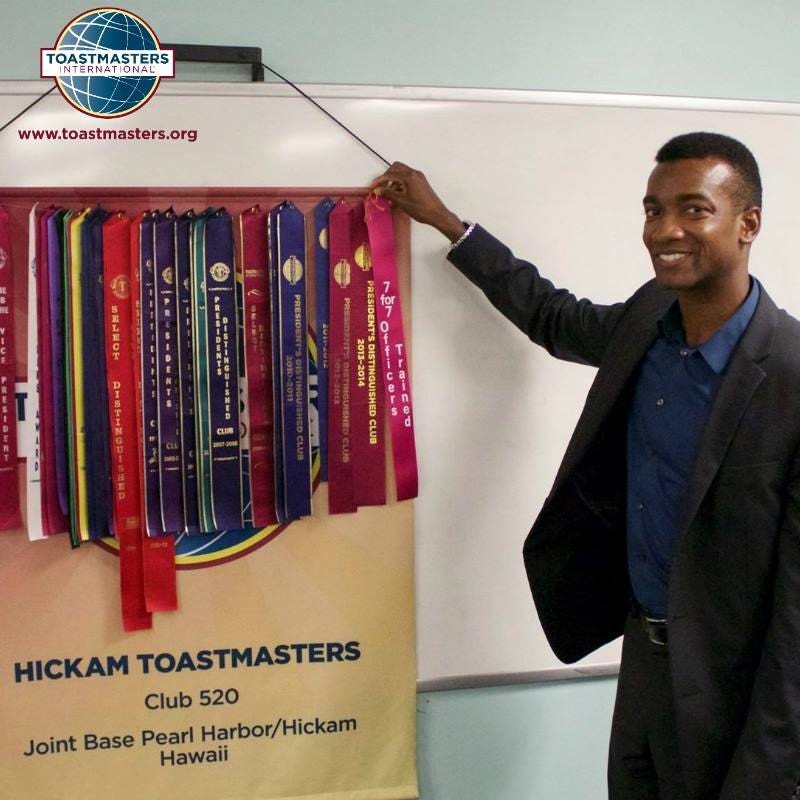
As VPE, I had the opportunity to create and host an event I called "Toast of Thrones".
Based on the wildly popular (at the time) Game of Thrones TV show, it was a great way to get the club excited about doing what we do best: giving speeches.
This is still one of my favorite performances I've ever recorded.
https://www.facebook.com/watch/?v=722530474450091
Here's another way to improve your public speaking:
Take on leadership roles in an organization you're interested in.
Every time I'm in charge of something, no matter how small, I always learn something new about myself. My speaking skills improve as well.
Yours can too.
The Wander Years
2016 was the year I left it all behind. My public speaking progress reflected it.
You know when life seems to come at you all at once?
That was me that year.
I left the active duty military. I left Toastmasters. I left my career. I left my home state and moved to a new one (California).
More challenging yet, I left my identity as a military member behind.
Suddenly, everything was new and scary again.
It took me awhile to adapt to it all. I attended a single Toastmasters meeting in California, but it didn't stick. I had too many other things on my mind so I stopped going.
Things were happening, but results were slow and progress seemed invisible.
Looking back, I'm happy I took the time to begin truly exploring who I wanted to be outside of uniform during those years.
One of those explorations led me to writing online for the first time.
I'd always enjoyed writing, but up to that point, I'd only done it in the privacy of my journals.
That all changed in 2017. After an adventurous trip to Nicaragua, I published my very first article online.
How does writing help you improve your public speaking?
Writing helps you organize your ideas.
Organized ideas lead to clearer thinking.
Clearer thinking leads to better speaking.
When you're under pressure giving a speech, your thoughts can become tangled as you attempt to smoothly connect idea with the next, while staying engaged with your audience.
It can be a hard task.
That's why writing can help.
Bullshit Meter Alert
The greatest test for my ability to communicate in public came when I decided to become a high school math teacher, BEFORE I had my credential.
While I worked my way through my teacher certification, I was a substitute teacher at schools around my area.
Some of the toughest crowds I've spoken in front of were less than 30 people half my age.
I'm referring to high school students.
Kids are notoriously sensitive to a phony. Their bullshit meters are highly attuned to teachers who don't know what they're doing or intentionally try to deceive them.
One day I subbed at an inner-city middle school in Sacramento.
The class was bursting with students, none in their assigned chairs. Some were on their phones, one student chased another marker in hand—it was a shitshow.
I called for quiet to take attendance. They calmed down, then I was able to get through all 31 names on my roster.
Then I heard low laughter as I began to give them their task for the day.
One student said: "Last guy didn't make it til' lunch..."
The line was a lesson when it comes to doing anything in public, even speaking:
Some people want you to fail.
Don't let that discourage you though.
Teaching reinforced another powerful lesson for my public speaking:
Know your message and material 10 times better than your audience.
When you know your shit, your audience is less likely to challenge you in ways that will knock you off your game.
It also frees up mental space to focus on your delivery and creating better engagement with your audience.
Public Speaking 2.0
In January 2021, I published my first novel, a military game tech fiction story titled: Cereus & Limnic.
As a new fiction author, I knew I had a steep hill to climb before my story would find its way to people who wanted (or needed) to read it.
How was I going to find them?
I decided to start doing livestreams to promote the book. A new way to communicate with others across great distances.
Speaking through video chatting can be an awkward experience.
There's a lag between what you say and the audience's reaction.
Many people "multitask" while on video calls, which means they're not paying attention to you.
How can you better connect with your audience online?
Train yourself to look into your camera when giving a briefing or presentation online.
Doing YouTube videos can help with this.
The first few times you do it, it's gonna feel real awkward. Millenia of biological and social programming has trained you to look others in the eye. It helps you connect with them on a deeper level.
The problem with doing this online is that everyone's eyes are looking at different things. If you're looking at their screen (or your own) while you speak you’re missing out on an opportunity to engage with them.
My experience vlogging on YouTube prepared me for public speaking via digital platforms.
Here's a video from my YouTube channel about my epic trip to Antarctica to show you how I do it.
(Can you feel the connection?)
Speaking of YouTube, livestreams are another way to improve your public speaking skills online.
Streams tend to be fairly informal and impromptu.
They force you find something to talk about related to whatever you're streaming.
You’ll build flexibility and adaptability as a speaker, fast.
You also get rapid feedback if you’re doing well or boring people.
What should you stream?
Anything you have great interest in. It might be a hobby, something related to professional work or a game. As long as you're passionate about it, it's streamable.
Here’s me streaming a commentary about my audiodrama Cereus & Limnic. (It gets pretty deep.)
Another way to ensure a smoother performance online is to practice.
How much should you practice?
As much as needed to feel comfortable and confident.
I'll run through the main points of what I want to say during the livestream 3 times or more.
I practice planned Toastmasters speeches 10 times, before a meeting.
The preparation always pays off.
I practiced a training livestream I gave to a few friends on Discord 2 times before I gave it. It was an early training about ChatGPT.
The video ended up going mini-viral, peaking around 30K views.
While going viral isn’t typical, it speaks to how preparation (even just a little bit) can greatly increase your odds of giving a good performance on game day.
Bottom-line:
Want to feel like you absolutely crushed it after your next public talk?
Practice more!
Entrepreneurship Education
Teaching and livestreaming prepared me for the ultimate public speaking test: entrepreneurship.
When you run your own business, every decision is yours to make, every consequence yours to own.
The ability to communicate like a champion is a tremendously powerful weapon in your arsenal.
None of these is more powerful than having a concise elevator pitch.
You should be able to describe what you do and what you represent to a stranger within 30 seconds or less.
30 seconds or less!? Really Keith?
Yes. People are busy. And even if they're not really busy, they're busy appearing to be busy. Either way that doesn't leave much time for you to potentially disrupt their day with your ideas.
That's why you need to be prepared.
Here's a sample dialogue with my elevator pitch:
Person: "Keith, what do you do for a living?"
Me: "I run my own business."
Person: "What kind of business is it?"
Me: "It's a digital media business. I'm a writer and podcaster. I've written a few books and I create work online that helps others and aligns with my personal mission statement, which is to connect human cultures through education, technology, and story."
Person: "Wow. What's your book about?"
I've had the above conversation in many forms dozens of times over the past 2 or 3 years.
Most of the time, it doesn't lead anywhere, but sometimes it does. You never know.
What's your elevator pitch?
Do you have one?
If you're an entrepreneur (or thinking about becoming one) you should begin practicing it the next time you meet someone new.
The first few times will feel awkward.
You might even feel a stab of nervousness as you publicly claim to another real person who you are or what you aspire to be (I know I did).
But it will pass.
Do it enough times, then you will become that vision that you see in your head to others.
That's a super powerful feeling.
Panicky to President
I won the presidency, but I had no idea I was running.
At a Toastmasters officer meeting in May 2023, I was informed by the other officers that they had chosen me to be the president of the club.
I wasn't surprised.
My club consisted of American and Japanese members. As someone who's not only an active member, but also can speak English and a decent amount of Japanese, I was a natural choice.
In July 2023, I formally accepted the role of President of the Oki Orators Toastmasters club.
This was my acceptance speech.
https://www.facebook.com/watch/?v=263003186330862
Although Toastmasters is not a well-known organization, it is still an opportunity to lead and grow my public speaking skills further.
After reading this, I hope you understand that the man you see in the above video wasn't made overnight.
Yes, I possessed some natural ability to speak in front of others, but it didn't get me very far.
Most of my proficiency was carefully crafted through disciplined training, thoughtful experimentation, and a whole lot of failure.
You can become a confident communicator. You can feel more comfortable with your audience, your message, and yourself.
It starts by believing that what you have to say has value, is important, and could be potentially life-changing for the person or people on the receiving end.
Once you do that, there's no limit the number or nature of relationships you can build.
I hope you enjoyed this read.
One of the fastest ways to improve your public speaking skills is to get feedback from someone who cares.
You can do that by joining a local Toastmasters chapter (if you're Okinawa, look up the Oki Orators!)
I also offer 1-on-1 coaching, designed to help you rapidly sharpen your message and gain the confidence to deliver it effectively to others.
If you're interested, find more information here.
Finally, helping others find fulfillment through creativity is one of my goals. One way I do that is through my newsletter The Creative Futurist.
Get access to exclusive training and opportunities to connect with other visionary creatives. Read more here.
***
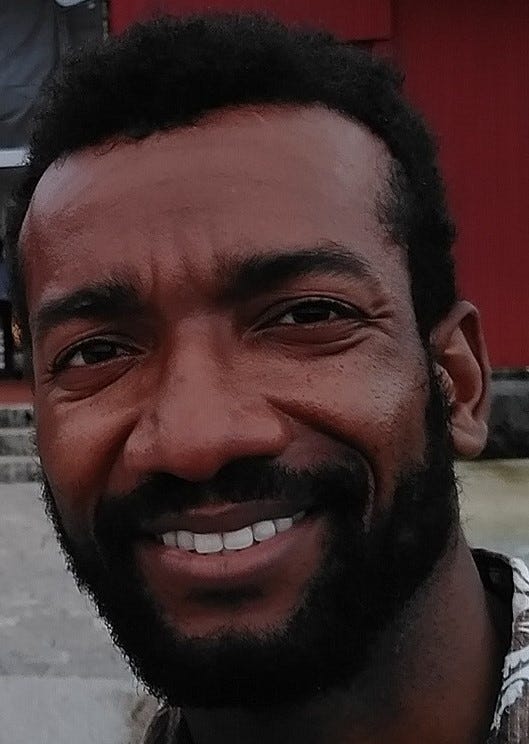
Keith Hayden is an author, creative business consultant, and entrepreneur. He is the founder of Hayden Academy Collective (HAC) Studios. A media education company that aims to provide tools and training to aspiring and seasoned creators.

